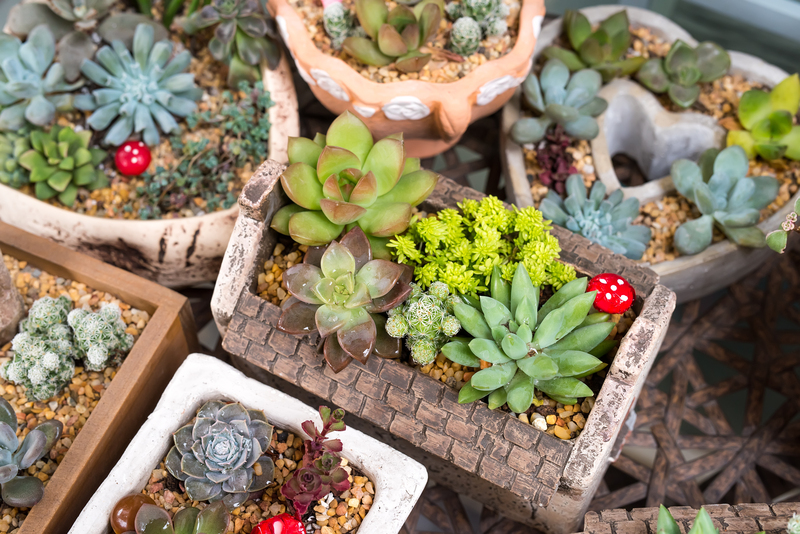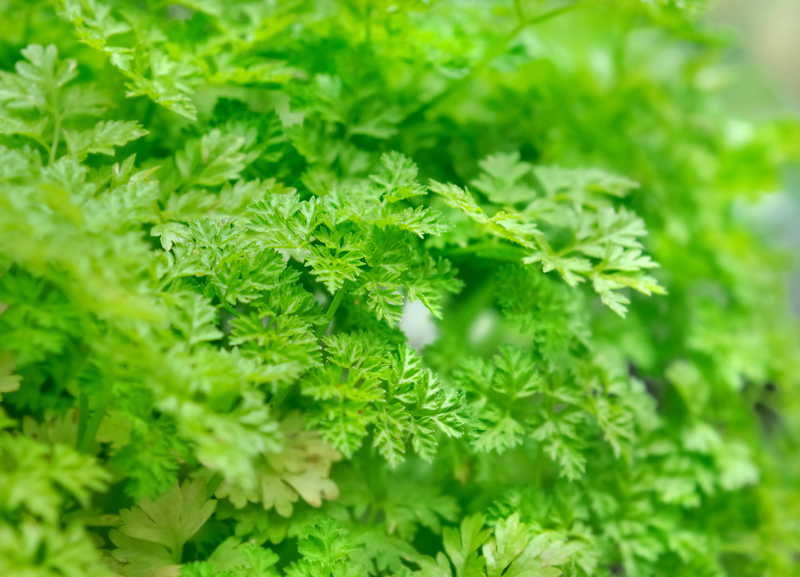Harnessing Nature's Secrets for Better Orchid Care
Posted on 19/05/2025
Harnessing Nature's Secrets for Better Orchid Care
Orchids have beguiled plant lovers for centuries, thanks to their exquisite flowers, vast variety, and almost magical allure. Yet, their reputation for being delicate and challenging to nurture has discouraged many enthusiasts. The key to successful orchid care lies in understanding and harnessing the secrets that nature employs to help these fascinating plants thrive in their native environments. In this comprehensive guide, we'll unveil those secrets and show you how to utilize them for optimal orchid care at home.

Understanding the Natural Habitat of Orchids
To master orchid cultivation, one must first comprehend where and how these plants grow in the wild. Orchids are one of the largest families of flowering plants, with over 25,000 species found worldwide, from humid rainforests to temperate regions.
- Epiphytic Orchids: The majority of commonly grown orchids, such as Phalaenopsis and Cattleya, are epiphytes — meaning they grow on trees, not in soil.
- Terrestrial Orchids: Some, like Cymbidium, grow in the forest soil, often with a rich layer of decaying organic matter.
- Climate Variability: Orchids have adapted to fluctuating conditions, including rainfall, temperature, and humidity. They are masters at maximizing limited resources.
Appreciating these natural origins is essential as you seek to replicate optimal growing conditions within your home or greenhouse, truly harnessing nature's hidden secrets for better orchid care.
Light: The Lifeblood of Orchids
Light is the most vital element for orchid growth and flowering. In the wild, epiphytic orchids bask in dappled sunlight filtering through a forest canopy. Too little or too much light can spell disaster.
Tips for Harnessing Natural Light for Orchids
- Diffuse Sunlight: Place orchids near east or south-facing windows with sheers or blinds. Direct afternoon sunlight can scorch leaves.
- Artificial Lighting: Use full-spectrum LED grow lights if natural light is limited, placing them 12-24 inches above the plants.
- Leaf Color: Monitor leaf color for clues: healthy orchids usually have bright apple-green leaves; a reddish tinge may indicate too much sun, while dark, listless leaves hint at insufficient light.
Humidity: Unlocking Orchid Vitality
Most orchids originate from regions with high humidity, typically between 50%-80%. Humidity not only helps prevent water loss but also supports robust root and leaf development.
Enhancing Humidity for Thriving Orchids
- Humidity Trays: Place pots on trays filled with water and pebbles, ensuring pots do not sit in water.
- Grouping Plants: Cluster orchids together to naturally elevate localized humidity.
- Misting: Lightly mist orchids each morning during dry spells, imitating tropical rain.
- Humidifiers: Invest in a room humidifier, especially during winter or in arid climates.
By adjusting humidity levels, you can harness natural moisture cycles that orchids rely upon in their native habitats, ensuring lusher growth and enhanced blooms.
Watering: Mimicking Nature's Rhythm
In their natural environment, orchids depend on infrequent, drenching rains followed by rapid drying due to air movement. The most common mistake is overwatering. Mastering a natural watering rhythm is a powerful secret for successful orchid care.
Natural Watering Techniques for Healthy Orchids
- Soak and Dry: Water thoroughly, soaking the orchid's medium, then let it dry before watering again. Roots need both moisture and air.
- Check the Roots: Water when the roots turn silvery white. Green roots indicate enough moisture.
- Seasonal Adjustments: Water more in active growth (spring/summer) and less during dormancy (fall/winter).
- Rainwater: Use rainwater whenever possible; orchids thrive on its natural purity and mineral balance.
Air Circulation: Nature's Disease Prevention
In the wild, a constant breeze keeps orchids healthy by discouraging fungal growth, rot, and pests. Replicating this natural airflow is essential indoors:
- Fans: Use small oscillating fans to mimic gentle forest breezes, particularly in enclosed spaces.
- Window Ventilation: Open windows whenever possible for natural airflow, without subjecting orchids to cold drafts.
- Spacing: Avoid crowding to improve air movement around each plant.
Harnessing nature's air currents enhances orchid resilience and contributes to long-term vigor.
Growing Medium: Unlocking Nature's Soil Secrets
Unlike typical houseplants, epiphytic orchids possess aerial roots adapted to clinging to tree bark, drawing nourishment from organic detritus and rain. Selecting the right growing medium is a pivotal orchid care secret.
Replicating the Perfect Orchid Medium
- Bark Mixes: Mimic tree bark by using orchid bark blends (fir, pine, or cypress).
- Sphagnum Moss: Retains moisture yet allows air flow, especially for young or recovering orchids.
- Coconut Husk & Perlite: Improves drainage and aeration. Modify the blend based on the species and environment.
- Charcoal: Acts as a natural filter, preventing bacterial and fungal accumulation.
Re-pot every 1-2 years as the medium breaks down, just as orchid habitats replenish naturally with fresh organic matter.
Feeding: Emulating Nature's Nutrient Cycles
In rainforests, orchids absorb nutrients from decaying leaf litter washed down by rain. Providing the right nutrition will encourage vigorous growth and abundant blooms.
Nutrient Secrets for Exceptional Orchid Health
- Orchid Fertilizer: Use a balanced, water-soluble orchid fertilizer (20-20-20 or similar) at half-strength every 2-4 weeks.
- Natural Supplements: Occasionally supplement with organic teas (kelp, compost brew) to boost micro-nutrients.
- Flush the Medium: Rinse the pots with plain water monthly to prevent salt build-up, simulating rainwater leaching nutrients in nature.
- Reduce Fertilizer in Dormancy: When growth slows, dilute or withhold feeding to align with the plant's natural cycles.
Temperature: Recreating Species-Specific Climates
Orchids grow across diverse climates, so temperature management is crucial for your chosen species. For most popular orchids:
- Warm-Growing Orchids: Thrive at day temperatures of 70-85?F (21-29?C) and night lows of 60-65?F (16-18?C).
- Cool-Growing Orchids: Prefer daytime temps as low as 55?F (13?C) and chilly nights around 50?F (10?C).
Replicate natural temperature drops at night to trigger robust blooming cycles. This is Mother Nature's subtle signal for orchids to put on their best floral displays.
Seasonal Adaptations and Blooming: Harnessing Natural Cycles
Wild orchids adapt to dry and wet seasons by entering active or dormant phases. Many require a cool, dry rest to initiate flower spikes. To master orchid care, you must observe and leverage these seasonal shifts.
Encouraging Reblooming with Nature's Techniques
- Reduce Water and Fertilizer After Blooming: Mimic the natural dry season to help the plant recharge.
- Expose to Cooler Nights: For Phalaenopsis, 2-4 weeks of night temperatures around 55?F (13?C) can trigger spikes.
- Observe for New Growth: Resume regular care as fresh leaves and roots appear.
Natural Pest and Disease Management
In their native homes, orchids use natural defenses to resist pests and diseases. At home, avoid harsh chemicals and embrace organic solutions inspired by nature:
- Manual Removal: Control pests like mealybugs or spider mites with a soft brush or cotton swab dipped in rubbing alcohol.
- Neem Oil: A natural, plant-based insecticide and fungicide. Spray diluted neem oil as a preventive.
- Beneficial Insects: Ladybugs and predatory mites can be introduced in greenhouses for eco-friendly control.
- Improved Culture: Only water in the morning and avoid water on leaves to reduce infection risk.
The Benefits of Harnessing Nature's Secrets for Orchid Care
Following the lessons hidden in nature leads to an incredible range of benefits for every orchid grower:
- Healthier plants with improved resilience to stress, pests, and diseases.
- Longer-lasting, more frequent, and spectacular blooms.
- Reduced maintenance thanks to nature-inspired, self-sustaining cycles.
- A deeper understanding and appreciation for the intricate beauty of orchids.
- Eco-friendly cultivation practices aligned with natural ecological rhythms.

Frequently Asked Questions About Harnessing Nature's Secrets for Better Orchid Care
How often should I water my orchid?
Water only when the potting medium is approaching dryness. This reflects the natural soak-and-dry cycles found in wild orchid environments. Depending on your home conditions, this can range from every few days to weekly.
Why won't my orchid bloom again?
Lack of flowers is often due to poor light, insufficient temperature drop between night and day, or overwatering. Adjusting these factors to match the orchid's natural habitat is the essence of nature-inspired orchid care.
What is the best medium for orchids?
Bark mixes, sphagnum moss, and coconut husk/chips work well, mimicking tree bark. Refresh the medium every 1-2 years to support healthy roots — just like the ever-renewing forest floor.
Conclusion: Let Nature Be Your Guide for Exceptional Orchid Care
When you harness nature's secrets for better orchid care, you engage in a timeless partnership with these remarkable plants. Rather than battling their needs or guessing blindly, you respond to the cues nature has encoded over millennia. From proper light, humidity, and air circulation, to natural watering and feeding routines, your orchids can not only survive — but truly thrive.
Begin by observing your orchids with new eyes, appreciating their unique beauty and resilience. Apply these nature-inspired techniques in your home or greenhouse, and experience the transformation firsthand. Patience, observation, and respect for natural rhythms remain your greatest tools. With each new bloom, you'll celebrate not only your success but the enduring wisdom that nature has to offer for all orchid lovers.
Start harnessing nature's power today and watch your orchids flourish like never before!
Latest Posts
Cultivating Fun and Safety in a Children's Garden
Control Weeds Proactively with These Smart Tips
Nature's Peace: Designing an Outdoor Zen Retreat



